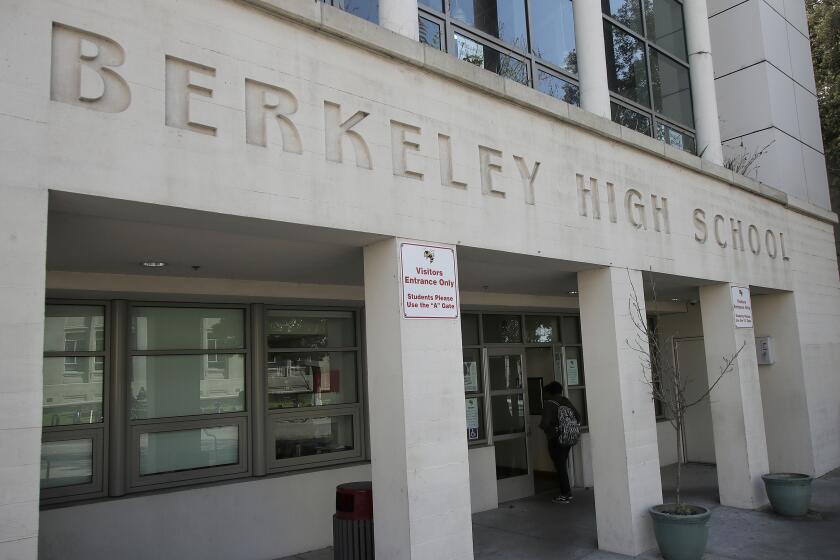California’s budget faces new legal challenges
Reporting from Sacramento -- California’s precariously balanced state budget, already teetering in the continuing economic upheaval, came under further siege Tuesday as two groups announced lawsuits challenging the spending plan.
School officials, including those at the L.A. Unified School District, said they would file suit Wednesday alleging that Gov. Jerry Brown and state legislators illegally manipulated California’s voter-approved education funding formula to shortchange them by $2 billion. And a coalition of disability-rights activists said they planned to sue Wednesday as well to block nearly $100 million in cuts to services for the developmentally disabled.
The new legal challenges add to a growing list of fiscal headaches for Sacramento.
The state is already in court battling redevelopment agencies over an attempt to take $1.7 billion from them. And California officials are pleading with the Obama administration for permission to reduce Medi-Cal spending by $1.7 billion.
The sluggish economy and turmoil in the financial markets, meanwhile, remain a huge budgetary threat. Lawmakers stitched together California’s spending plan in June by building in a $4-billion windfall from a rebounding economy. It is unclear whether that money will materialize.
“The recovery is stalled out,” said Jerry Nickelsburg, senior economist at the UCLA Anderson Forecast. “Slow growth means less income; less income means less tax revenue.”
If state income falls short of lawmakers’ budget forecast, automatic cuts inserted as a fiscal safeguard will go into effect, slashing spending on schools, universities, libraries and programs for the needy. Some school districts could shorten the academic year by up to seven days.
“There is a good chance we will see some of the spending cut triggers in the budget actually pulled,” Nickelsburg said. The first tier of cuts would take effect if California finance officials determine that the state’s tax collections later this year are at least $1 billion less than anticipated.
California finance officials say it’s not time for doom-and-gloom predictions — yet.
“It is too early to know,” said Jason Sisney, director of state finance at the nonpartisan Legislative Analyst’s Office, though he noted that the state faces strong economic “head winds.”
Tax revenue through August lagged $596 million behind projections, said H.D. Palmer, a spokesman for the Department of Finance. But he said the most important data — the state’s fall economic forecast, for example — are still to come.
The new lawsuits could compound the state’s financial troubles. The schools litigation is a particularly unwelcome surprise for Democratic lawmakers and Brown, who believed they had averted a legal challenge by striking a last-minute deal in June with the state’s powerful teachers union that protected classroom jobs.
Spokesmen for the Legislature’s top leaders declined comment until the suit is formally filed. Palmer said the administration expects to prevail in court.
By law, school spending accounts for about 40% of state spending. Brown and lawmakers skirted that requirement this year by converting more than $5 billion to local funds, thus reducing the education calculation. The teachers union signed off on the plan when it received guarantees that instructors would not be laid off and state officials agreed to pay back the missing $2 billion if a broad tax measure fails at the ballot in 2012.
The coalition of school boards and administrators decided to sue anyway.
“We were really terribly underfunded before the recession began three years ago,” said Bob Wells, executive director of the Assn. of California School Administrators. “There just has to be a stop to those sorts of cuts.”
Los Angeles Unified spokesman Tom Waldman acknowledged that his district would be among the plaintiffs but declined to comment further until the suit is filed.
Advocates for the disabled are suing over a smaller slice of the budget: a nearly $100-million cut in providers’ reimbursements. Tony Anderson, executive director of the Arc California, a disability-rights group that is a plaintiff in the lawsuit, said he was “fearful of the future of the system” and the litigation is necessary to preserve programs for the needy.
Palmer declined to comment on that lawsuit because his office had not yet seen it. But he said the state felt “very confident” about the redevelopment litigation, which is expected to be resolved by the state Supreme Court in the coming months.
Palmer said state officials are also “feeling good” about their chances of receiving a federal waiver to enact at least a portion of the $1.7 billion in Medi-Cal cuts. He said the state had received positive preliminary responses to its effort to reduce what medical providers, such as doctors, are paid for Medi-Cal services.
More to Read
Get the L.A. Times Politics newsletter
Deeply reported insights into legislation, politics and policy from Sacramento, Washington and beyond. In your inbox three times per week.
You may occasionally receive promotional content from the Los Angeles Times.






